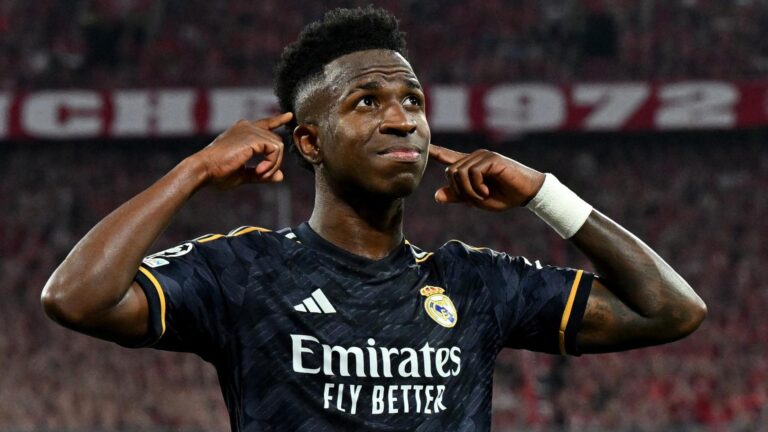MADRID – Two individuals have been convicted of a hate crime in Spain after hanging an effigy of Brazilian football star VinĂcius JĂşnior from a bridge, authorities confirmed. The incident, which drew widespread condemnation, highlighted ongoing concerns about racism in sports. According to court documents, the defendants were found guilty of targeting VinĂcius JĂşnior with a deliberately offensive act, marking a significant legal response to racism against athletes in Spain.
Fans Convicted of Hate Crime for Hanging VinĂcius JĂşnior Effigy in Spain
In a landmark decision, Spanish authorities have found a group of football fans guilty of a hate crime after they displayed an effigy of Real Madrid star VinĂcius JĂşnior hanging from a bridge during a match earlier this year. The shocking act, widely condemned across the sports community and beyond, has been recognized by the courts as a manifestation of racial hatred and discrimination. The sentence includes both fines and community service, sending a clear message about Spain’s commitment to combating racism in football and society.
- Incident Location: Bridge over A6 highway, Madrid
- Date of Incident: March 2024
- Verdict: Convicted of hate crime
- Penalties: Monetary fines, community service, and mandatory anti-racism education
- Victim’s Reaction: VinĂcius JĂşnior expressed relief and hope for lasting change
| Aspect | Details |
|---|---|
| Legal Basis | Spanish Penal Code, Hate Crime Statutes |
| Community Impact | Heightened awareness and anti-racism campaigns |
| Football Federation | Support for zero-tolerance policies |
Legal Ramifications and Social Impact of Racist Acts in European Football
The conviction of the fans involved in displaying an effigy of VinĂcius JĂşnior from a bridge marks a significant legal precedent in addressing racism within European football. Spanish courts categorically classified the act as a hate crime, emphasizing that such behavior transcends mere hooliganism and directly undermines societal values of equality and respect. This ruling aligns with broader European efforts to combat discrimination in sport through stringent legal frameworks and reflects an increased willingness among authorities to impose severe penalties on perpetrators who incite racial hatred. The offenders now face potential criminal records, fines, and possible bans from attending football matches, signaling zero tolerance for racist provocations.
Beyond the courtroom, the social repercussions resonate deeply within the football community and beyond. Clubs, fans, and governing bodies have united to condemn the incident, reinforcing campaigns aimed at fostering inclusivity and diversity. The episode spotlighted ongoing challenges that Black players face, not just on the pitch but in their daily lives, prompting renewed calls for proactive measures including:
- Enhanced educational programs targeting clubs and supporters
- Increased surveillance and policing to prevent hate-driven displays
- Stricter regulations from football governing organizations like UEFA and FIFA
The case also serves as a catalytic moment encouraging social media platforms and sponsors to adopt harder stances against racism, recognizing their role in shaping public discourse and supporting the fight against discriminatory acts in sport.
Recommendations for Combating Racism and Protecting Players in Sports Communities
Sports organizations and communities must implement a zero-tolerance policy against racial abuse by establishing clear protocols for reporting and investigating incidents promptly. Educational programs focused on diversity and inclusion should be mandatory for fans, players, and staff to raise awareness about the damage caused by racist behavior. Collaboration with local authorities and anti-racism organizations can enhance these measures by providing additional support and resources.
To protect players effectively, venues should increase security presence and surveillance, particularly around high-risk areas, such as bridges or fan congregation points. Clubs can also offer psychological support and legal assistance to victims. The following table summarizes key actions recommended for combating racism in sports:
| Action | Purpose | Responsible Parties |
|---|---|---|
| Zero-tolerance policies | Deter and punish racist acts | Sports Federations, Clubs |
| Educational programs | Raise awareness and promote inclusion | Leagues, Community Groups |
| Enhanced security measures | Protect players and prevent incidents | Stadium Authorities, Police |
| Psychological and legal support | Support victims’ wellbeing and rights | Clubs, Player Associations |
Wrapping Up
The conviction of the fans who hung an effigy of VinĂcius JĂşnior from a bridge marks a significant moment in the ongoing efforts to combat hate crimes and racism in sports and society at large. Authorities in Spain have underscored their commitment to holding individuals accountable for actions that promote discrimination and intolerance. As the case concludes, it serves as a stark reminder of the challenges still facing communities seeking to eradicate hate and uphold respect for all athletes and individuals.




